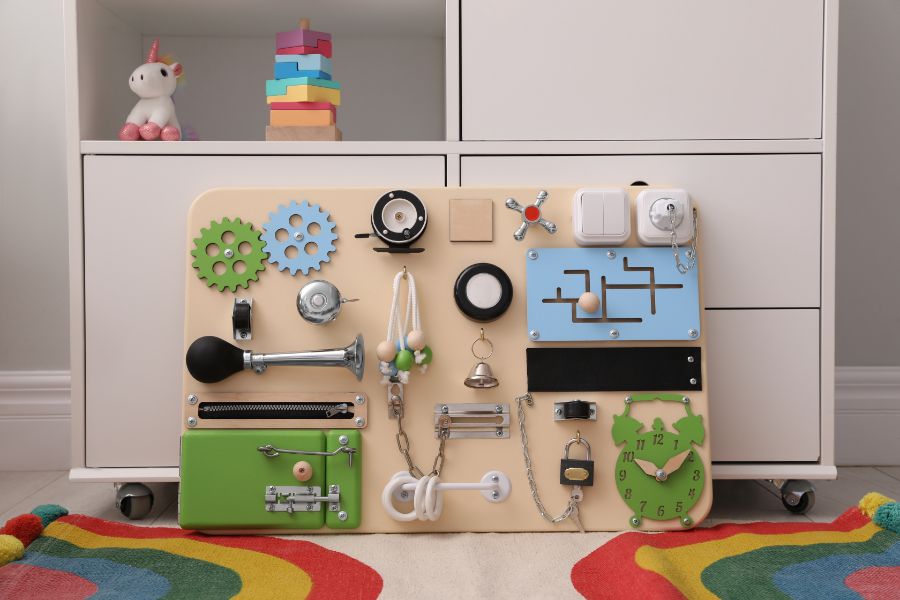The Power of Play: Fun Activities to Stimulate Your Baby’s Development
Playing with your baby is more than just important—it's crucial for their development. Cognitive and motor skills, emotional growth, and social abilities all benefit. For younger babies, try tummy time, hand puppets, or sound imitation. As they get older, games like peek-a-boo and make-believe help stimulate their senses and enhance fine motor skills. This isn't just play, it's a fundamental part of your baby's cognitive and physical growth. If you carry on, you'll discover even more about the wonders of play and how it can enrich your baby's world.
Main Points
- Engage babies in activities like hand puppets, gentle dancing, and stacking blocks to stimulate cognitive and motor skills development.
- Play games like peek-a-boo and rolling a ball with babies aged 7-12 months to enhance cognitive development and hand-eye coordination.
- For toddlers, make-believe play and movement exploration through singing, dancing, and storytelling foster creativity and social skills.
- Preschoolers benefit from complex and interactive play, problem-solving activities, and outdoor play, promoting cognitive growth and social interaction.
- Adopt safe tummy-time practices and baby gym activities to strengthen muscles and boost physical development.
Understanding the Power of Play
Delving into the power of play, you'll quickly realize its essential role in promoting cognitive, physical, social, and emotional development in children. It's not just about fun and games. Play is a dynamic catalyst for child development, fostering creativity and enhancing crucial motor skills. As you encourage your child's playful activities, you're also bolstering their confidence and emotional resilience.
Play aids in cognitive development, honing problem-solving skills and critical thinking. It serves as a platform for language development, allowing children to experiment with words, sounds, and their meanings. Through this, they gain a better understanding of the world around them.
Closely observe your child's social interactions during play. It's through these exchanges they learn essential life skills like collaboration, negotiation, and empathy. Play is also a potent stress-buster, helping children express and regulate emotions, fostering a healthy emotional equilibrium.
In essence, play is a profound educator, shaping a child's understanding and interactions with the world. It's an investment in their future, nurturing their growth and resilience. So, embrace the power of play and watch as your child blossoms, gaining skills and experiences that will serve them well throughout their lives.
Activities for 0-6 Months Old Babies
Plunge into the first six months of your baby's life, a period ripe with opportunities for engaging activities like crafting hand puppets, gentle dancing, and playing pat-a-cake, all designed to stimulate your little one's development. These activities not only bring joy and laughter but also help in fostering sensory and motor skill development.
Supervised tummy time is one of the vital activities during this phase. It strengthens the baby's neck, shoulders, and trunk, preparing them for the milestone of rolling over. Encourage this by placing colorful toys just out of their reach.
Imitating your baby's sounds can seem like a simple game, but it's more than that. It lays the foundation for communication skills and language development. Similarly, lifting your baby up and down while singing tunes can be both entertaining and beneficial, enhancing their sense of rhythm and balance.
Boost your child's hand-eye coordination and foster exploration with homemade stacking blocks. They can be made easily from clean milk cartons and colorful contact paper. They're a fantastic tool for your child to interact with their environment, promoting cognitive development along the way. Remember, every playful moment is a step towards their growth.
Fun Play for 7-12 Months Old Babies
As your baby grows into the 7-12 months phase, a world of exciting and beneficial activities opens up, offering endless ways to stimulate their development and curiosity. Your little one is now ready for more physical engagement that will not only entertain them, but also foster their development.
One classic game to play is peek-a-boo, which enhances your baby's cognitive development by introducing the concept of object permanence. Try hiding a rattle and then revealing it to pique their interest. This sensory exploration can captivate their attention and promote curiosity.
Incorporate hats into playtime as well. Let your child put them on and off their head, stimulating not just sensory exploration, but also fine motor skills. Additionally, gentle bouncing on your lap or rocking can provide soothing rhythms that your baby can enjoy.
Rolling a ball back and forth is another excellent activity to boost hand-eye coordination and social engagement. As your baby tracks the ball visually and attempts to grab it, they're learning critical skills that will benefit them in the long run. Remember, play isn't just fun but also a powerful developmental tool.
Stimulating Games for 1-3 Year Olds
Frequently, the age range of 1-3 years opens up a plethora of stimulating games that not only entertain your child but also greatly enhance their creativity, cognitive abilities, and social interactions. This is a time when your child's world expands, and they begin to explore the world around them actively.
Here are three stimulating games that are beneficial for 1-3 year olds:
- Make-believe play: Encourage your child to assume different roles and create imaginative scenarios. This will foster their creativity and cognitive skills.
- Peer play: Schedule regular playdates with other children. It's a wonderful opportunity for your child to learn about sharing, cooperation, and other social skills.
- Exploration of movements: Singing, dancing, drawing, and storytelling are excellent activities for this age. These games promote cognitive and emotional development while being fun and engaging.
Engaging Play for 4-6 Year Olds
When your child hits the 4-6 year age bracket, it's the perfect opportunity to engage them in more complex and interactive play, which can greatly enhance their creativity, social interaction, and cognitive growth. Encourage activities such as singing, dancing, drawing, and storytelling. These forms of imaginative play stimulate their creativity and improve their social skills.
Schedule regular playdates to offer your child the chance to interact with peers. This not only promotes their social skills but also teaches them the value of cooperation. Introduce games and tasks that involve problem-solving, sparking their cognitive growth and decision-making skills.
Foster a love for exploration in your child. Engage them in hands-on activities and make-believe play, which can ignite their curiosity and imagination. This exploration is crucial for their overall mental growth.
Don't forget the importance of outdoor play. Spending time in nature can improve their spatial awareness and balance. It also enhances their attention span and contributes to their overall physical and mental well-being. As you can see, playtime for 4-6 year olds is more than just fun, it's an essential part of their development.
Advantages of Different Types of Play
Delving into the world of play, it's essential to understand that different types of games and activities offer unique benefits for your child's development. As an enthusiastic guide in your child's exploration, you can support them to gain skills and experiences that can positively shape their growth.
- Pretend Play: This type of play sparks creativity and imagination while promoting language skills and social interaction. Your children learn to express themselves and understand others, fostering their empathy and emotional intelligence. It's an important way of exploring the world around them and their place in it.
- Sports and Active Games: Beyond the physical benefits like gross motor skills, these activities teach discipline, teamwork, and leadership. They also contribute to mental health by providing opportunities for stress relief and building self-confidence.
- Puzzles and Problem-Solving Activities: These provide a platform for your child to develop patience and persistence. They learn to think logically and strategically, skills that are beneficial in every aspect of life.
The Role of Toys in Play
In the domain of play, toys serve an essential role, stimulating your baby's development through sensory exploration and cognitive growth. When your child engages with different toys and objects, they learn about shapes, colors, textures, and cause-and-effect relationships. This active play not only entertains but also builds skills that are important for their growth.
Interactive toys, for instance, foster curiosity and engagement. As your child manipulates the toys, they are not just having fun but also developing fine motor skills. This simple act of grasping and interacting with objects contributes importantly to their physical and cognitive development.
Toys also facilitate make-believe games, which are excellent for your child's imagination and creativity. Through these games, your child learns to problem-solve, negotiate roles, and understand the world around them – all while having a great time.
Promoting Physical Play
Promoting physical play is essential for your baby's development, and there are several ways you can engage them. From exploring baby gym activities to incorporating outdoor playtime, you're not just entertaining your little one but also aiding their growth. Understanding safe tummy-time practices can help enhance their motor skills and muscle strength as well.
Exploring Baby Gym Activities
You'll find that baby gym activities offer a fantastic way to stimulate your little one's physical development, from enhancing gross motor skills like crawling and rolling to boosting finer abilities such as grasping and hand-eye coordination. These activities not only promote physical play but also encourage exploration and understanding of spatial relationships.
Here are three key benefits of baby gym activities:
- Gross Motor Skills Development: Through crawling, rolling, and reaching, your baby strengthens their muscles and improves coordination.
- Fine Motor Skills Enhancement: Activities that involve grasping or touching promote hand-eye coordination and precision.
- Cognitive Growth: Exploration in a baby gym fosters understanding of balance and spatial relationships, supporting cognitive development.
Outdoor Playtime Essentials
Stepping outside with your little one can offer a world of benefits, from enhancing gross motor skills and balance, to sparking creativity and problem-solving abilities. Outdoor play boosts not only physical development but also contributes greatly to your baby's mental health and overall well-being. It's a natural platform for nature exploration, stimulating sensory curiosity, and fostering an appreciation for the environment. More than just fun, outdoor play is linked to improved academic performance. It paves the way for developing social skills, as your child learns to interact and cooperate with others. So, don't underestimate the power of a good romp in the park—it's an essential part of your baby's development journey.
Safe Tummy-Time Practices
Starting your baby's physical play, safe tummy-time practices play an essential role in strengthening their neck, back, and shoulder muscles, paving the way for milestones like crawling and sitting. Pediatricians recommend tummy time from birth to aid your baby's physical development and motor skill development. This supervised activity also prevents flat spots on your baby's head.
Here are three tummy-time tips:
- Start with short sessions and gradually increase the time as your baby gets stronger.
- Make it fun by using toys or mirrors to keep your baby entertained.
- Always supervise your baby during tummy time to guarantee safety.
The Magic of Pretend Play
Delving into the magic of pretend play can open up a world of imagination, facilitating not only your child's creativity and problem-solving skills but also their social interactions. Through imaginative scenarios, your little one explores different roles, enhancing their understanding of societal norms and emotions. Pretend play, thus, is an essential part of their creative development.
Your child's pretend play isn't just fun and games. It's a foundation for their cognitive development, boosting their storytelling abilities and emotional intelligence. When they role-play with toys or their peers, they're learning empathy and perspective-taking. They're learning to step into someone else's shoes, to understand others' feelings and viewpoints.
Encourage your child's pretend play. Provide them with a variety of toys that can help them enact different roles. Set up an environment that fosters their imagination. Encourage their dialogue, engage with their stories, and validate their emotions. In doing so, you're not just nurturing their creativity, but also helping them develop important life skills. The magic of pretend play lies in its simplicity and the profound impact it has on your child's development.




